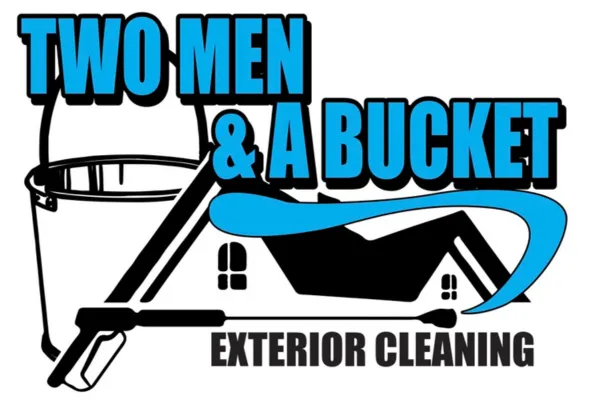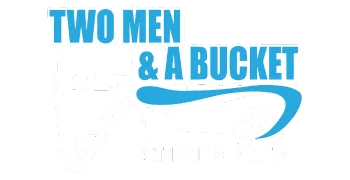Have Questions?
Checkout our blog you'll probably find the answer...

Soft Washing vs Pressure Washing

Two Men and A Bucket's Website
PHONE: 314-761-9049
EMAIL: twomenexteriors@gmail.com
More On Soft Washing Here!
Soft Washing vs Pressure Washing
Introduction
Keeping the exterior of your home or business clean is crucial for maintaining its appearance and value. Two primary methods for exterior cleaning are soft washing and pressure washing. Each has its own set of advantages and is suited to different surfaces and conditions. This blog post aims to help homeowners and business owners in St. Louis make informed decisions about which method to use.
What is Pressure Washing?
Pressure washing uses high-pressure water spray to remove dirt, mold, grime, and other contaminants from surfaces. It is particularly effective for hard surfaces that can withstand the force of the water.
Common Tools and Equipment:
Pressure Washers: Machines that generate high-pressure water. They come in various sizes and power levels.
Surface Cleaners: Attachments that help clean large, flat areas more evenly.
Nozzles and Attachments: Different nozzles can adjust the pressure and angle of the spray for various applications.
Typical Surfaces Cleaned with Pressure Washing:
Concrete Driveways and Sidewalks: Ideal for removing stains and built-up dirt.
Brick Walls: Effective at cleaning off years of accumulated grime.
Metal Surfaces: Great for restoring shine and removing rust.
What is Soft Washing?
Soft washing uses a low-pressure spray combined with specialized cleaning solutions to safely remove mildew, bacteria, algae, and other organic stains from roofs and other building exteriors.
Common Tools and Equipment:
Low-Pressure Washers: Similar to pressure washers but operate at much lower pressure.
Water-Fed Poles: Extendable poles that allow for cleaning hard-to-reach areas without ladders.
Soft Bristle Brushes: Gentle on surfaces, used to scrub without damage.
Cleaning Solutions: Typically biodegradable and eco-friendly, designed to kill mold and mildew without harming the environment.
Typical Surfaces Cleaned with Soft Washing:
Roofs: Especially effective on shingles and tiles.
Siding (Vinyl, Wood, etc.): Safe for most types of exterior walls.
Windows: Prevents damage to glass and seals.
Comparing Methods: Advantages and Disadvantages
Cost:
Pressure Washing: Generally, the initial cost of equipment is higher, but there are minimal ongoing costs apart from water and electricity.
Soft Washing: Equipment might be less expensive, but the cost of cleaning solutions can add up over time.
Ease of Use:
Pressure Washing: Requires some skill to avoid damaging surfaces. DIY options are available but professional services are recommended for best results.
Soft Washing: Easier for beginners to use. The low-pressure system reduces the risk of damage.
Speed:
Pressure Washing: Faster for large, flat surfaces like driveways and walls.
Soft Washing: Takes longer because it relies on the cleaning solution to do most of the work.
Risk and Safety:
Pressure Washing: High risk of surface damage if used improperly. Can be dangerous to the operator due to the force of the water.
Soft Washing: Safer for surfaces and operators. Less risk of damage to delicate materials.
Considerations for Different Surfaces
Roofs:
Best Practices for Soft Washing Roofs: Inspect the roof, apply a cleaning solution with a low-pressure washer, and rinse thoroughly. Soft washing is recommended to avoid damaging shingles or tiles.
Risks of Using Pressure Washing on Roofs: High pressure can strip granules from shingles, leading to reduced lifespan and leaks.
Recommended Frequency of Cleaning: Generally, roofs should be cleaned every 2-3 years, or more frequently in areas with high humidity and mold growth.
Concrete and Driveways:
Effectiveness of Pressure Washing: Highly effective at removing deep-seated dirt and stains. Surface cleaners can help achieve even coverage.
Risks of Surface Degradation: Over time, high pressure can erode concrete surfaces. Sealants can help protect the surface after cleaning.
Alternatives and Supplements: Soft washing can be used for light cleaning, followed by pressure washing for stubborn stains.
Windows:
Soft Washing Techniques: Use water-fed poles and gentle cleaning solutions. Avoid high pressure to prevent breaking seals or cracking glass.
Avoiding Damage: Ensure proper rinsing to prevent streaks and spotting.
Consideration of Water-Fed Pole Systems: These systems allow for safe, effective cleaning of windows without the need for ladders.
Siding (Vinyl, Wood, etc.):
Soft Washing Benefits: Maintains the integrity of the siding material, preventing water infiltration and damage.
Risks of Pressure Washing: High pressure can force water behind the siding, leading to mold growth and structural damage.
Cleaning Solutions: Use solutions specific to the type of siding to ensure effective cleaning without damage.
Choosing the Right Professional Service
Selecting the right professional service for your exterior cleaning needs is crucial for achieving the best results and ensuring the longevity of your property. Here are some factors to consider when choosing a service provider:
Experience and Expertise:
Look for companies with a proven track record in the industry.
Check for certifications and training in both pressure washing and soft washing techniques.
Reputation and Reviews:
Read customer reviews and testimonials to gauge the quality of service.
Ask for references and follow up with past clients to get firsthand feedback.
Insurance and Licenses:
Ensure the company is fully insured to cover any potential damage or accidents.
Verify that they hold all necessary licenses and certifications for operating in your area.
Equipment and Techniques:
Inquire about the type of equipment they use and their cleaning processes.
A good company should use modern, well-maintained equipment and eco-friendly cleaning solutions.
Customer Service:
Evaluate their responsiveness and willingness to answer your questions.
A professional service should provide clear estimates and be transparent about their pricing and services.
Guarantees and Warranties:
Check if they offer any guarantees on their work or warranties for long-term results.
A reputable company should stand behind their services and provide some assurance of quality.
Conclusion
Choosing between soft washing and pressure washing depends on the surface being cleaned, the level of contaminants, and other factors like cost and safety. Soft washing is ideal for delicate surfaces like roofs and siding, while pressure washing is better suited for hard surfaces like concrete and brick. By assessing your specific needs and conditions, you can make an informed decision to keep your property looking its best.
For professional advice and services, contact Pressure Washing St. Louis. Our experienced team is here to help you achieve the best results for your home or business.
Frequently Asked Questions
Answers To Common Questions
How often should I have my exterior cleaned?
The frequency of exterior cleaning depends on factors such as the climate, level of pollution, and type of surfaces. Typically, it's recommended to have your exterior cleaned annually or bi-annually to maintain its appearance and prevent damage.
What are the benefits of exterior cleaning for my property?
Exterior cleaning not only improves the appearance of your property but also helps prevent deterioration caused by dirt, mold, mildew, and pollutants. It can extend the lifespan of your exterior surfaces and increase the overall value of your property.
Is exterior cleaning safe for my plants and landscaping?
Our exterior cleaning services use eco-friendly and biodegradable cleaning solutions that are safe for plants and landscaping. Additionally, precautions are taken to protect delicate vegetation during the cleaning process.
What are the different methods used for exterior cleaning?
Common methods for exterior cleaning include pressure washing, soft washing, hand washing, and chemical washing. The method used depends on the type of surface being cleaned and the level of dirt or stains present.
How much does exterior cleaning typically cost?
The cost of exterior cleaning varies depending on factors such as the size of the property, the type of surfaces being cleaned, and the level of cleaning required. It's best to request a quote from our website to learn more!
Why should we have our property cleaned?
Just like having your teeth cleaned, it helps prevent bigger, more expensive problems in the future, while making everything look nicer today.
